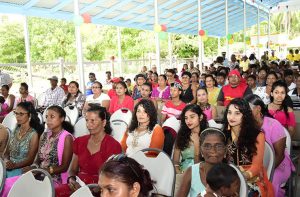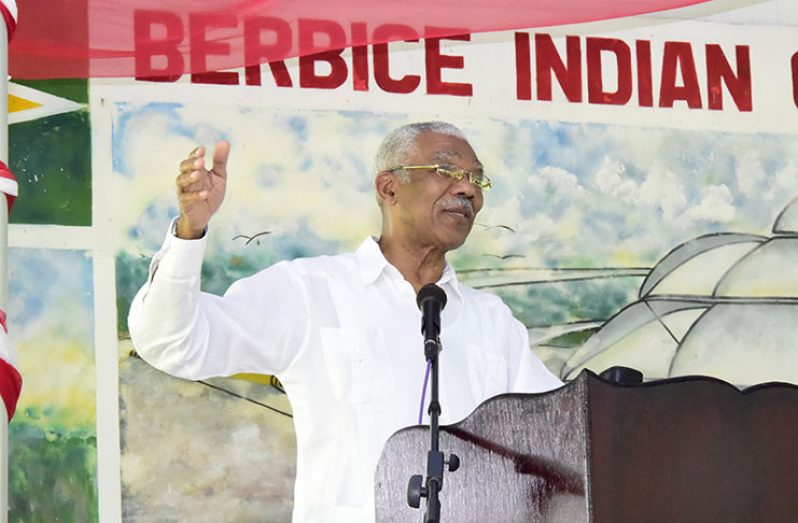– President Granger, as 180th anniversary of Indian Arrival observed
PRESIDENT David Granger on Saturday applauded the contributions of Indian indentured immigrants and their descendants to the building of Guyana, as he noted that the country is now richer, culturally, socially and politically because of these contributions.
The President was at the time speaking at the observance of the 180th anniversary of the arrival of East Indian Immigrants to Guyana, which was held at Plantation Highbury, East Berbice-Corentyne (Region Six), organised by the Berbice Indian Cultural Committee (BICC).
In his address, the President noted that while this day is generally recognised as ‘Arrival Day’ to commemorate the arrival of the Indians, Portuguese, Chinese and Europeans to what was then British Guiana, it is a day to celebrate East Indians and the contributions that they have made to the nation.
“I like to call May 5 Indian Arrival Day because it recognises, not only the historical event of arrival, but also of the survival of Indian indentured immigrants and their descendants. It was their resilience, their resourcefulness that allowed them to overcome adversity and it was their endurance that allowed them to change challenges into opportunities in particular ways,” he said.
The head of state noted that Indian indentured immigrants played an important role in the transformation of the economy. Noting that many of them traded their entitlement to a return passage to India for land in Guyana, President Granger said that these migrants, coming from India’s rural regions, helped to diversify and expand Guyana’s rural economy.

“They turned their indentureship into citizenship. From an economic point of view, Indians helped to transform the country that they adopted, what was then British Guyana. Indian skills in paddy and vegetable-farming, coconut-cultivation and cattle-rearing; and their skills as boatmen, charcoal-burners, goldsmiths, fishermen, hucksters, milk and sweetmeat vendors, shopkeepers and tailors enriched the entire economy. These are skills they brought from their homelands. All of these skills enriched the Guyanese society. We are richer now with Indian immigration. They brought their customs from the Indian villages and created villages in Guyana, based on those customs and culture. Indian resourcefulness and their agrarian roots in rural India were transplanted in Guyana,” he said.
From a political point of view, the President noted that East Indians also helped to transform their own lives and the lives of other immigrants who came to British Guiana, through their resistance to abuse, brutality, confinement, and domination of plantation life.
STOOD UP
“Their resistance included riots and strikes and many of them were killed. Indians, while a docile people, stood up for their rights and by standing up for their rights, they helped to preserve the rights for future generations and people like Dr. Joseph Latchmansingh was the head of the union that struck on the East Demerara that ended up with the shooting of the sugar workers. In other ways, the political footprint of Indian Guyanese was made more prominent and other Berbicians like Joseph Luckhoo was the first Indian elected to the Combined Court. He was followed by E.A. Luckhoo, A.E Seeram and J.B. Singh, Peer Bacchus, C. R. Jacob, A.M. Edun and, later, Dr. Cheddi Jagan and others,” the President said.
President Granger noted that this year also commemorates the 100th birth anniversary of Dr. Cheddi Jagan, the son of Indian indentured immigrants as he said that Dr. Jagan’s contribution is perhaps the most outstanding of Indo Guyanese in the struggle for national liberation. In this regard, all Guyanese have shown him the respect which is due to him. “From a political point of view, Indians were able to make Guyanese and preserve the rights of Guyanese and the contributions that they made have been able to make the lives of all Guyanese more dignified,” the head of state noted.
Even as the country observes and celebrates the contributions of Indo-Guyanese, the head of state noted that it is important that these observances be used as a vehicle for social cohesion and to promote a greater sense of each other’s customs and traditions.
Migrants learnt to live as neighbours rather than fight each other as enemies and this must become ingrained in today’s society as well, the President said. The Head of State also noted that the country’s diversity should be seen as an asset and not a liability and every group must be celebrated.
“Social Cohesion recognises that Guyana is now and always will be, multi-ethnic, multi-cultural and multi-religious. It recognises these differences between various social groups and fosters respect for each other. We have fought 180 years to be where we are today and to bring our people together and we cannot turn back. Our diversity is an asset, not a liability. I am proud to be in a country of many races. I don’t want to live in a garden made up of just grass. I want to live in a garden with beautiful, colourful flowers. We are proud of the variegated tapestry of ethnicity. We are proud of our shared past as we plan for our common future. We have been told by Martin Luther King, ‘We may have all come in different ships, but we are in the same boat now!’ That is true, but we are all Guyanese now and we have to make a success of this nation that we have put together. Our destinies are intertwined forever in our nation’s future. We must swim together or sink separately. Guyana, on this Indian Arrival Day, pays homage to the Indian indentured immigrants and their descendants. Indian-Guyanese can be proud of their contribution to the nation. I applaud their continuing role in nation-building,” the President said.
Sharp reminder
Chairman of East Berbice-Corentyne (Region Six), Mr. David Armogan in his remarks echoed President Granger’s sentiments, noting that Arrival Day serves as a sharp reminder to all Guyanese that social cohesion cannot be taken for granted and that a cohesive state is the most fitting homage and the best tribute that Guyanese can pay to their ancestors. “Many descendants of Indian immigrants have taken their places all over the world. In Guyana, they have made tremendous contributions to their country. No one can deny that. In as much as Guyana is progressing based on the hard work of our ancestors and the continuing hard work of their descendants, there are difficulties we must surmount and I believe that the time has come in this country for us to put our differences aside and work for the development of Guyana. That is the only way that we will be able realise the dreams of our foreparents. It is the only way we can pay the greatest tribute to our foreparents, by developing the land that they struggled so hard to leave for us,” Armogan said.
The event was also attended by First Lady Sandra Granger; Minister of Social Cohesion, Dr. George Norton; Minister within the Ministry of Finance, Jaipaul Sharma; members of the diplomatic corps and the Indian High Commissioner to Guyana.
The first batch of Indians arrived in Guyana 180 years ago to work as indentured immigrants on the sugar plantations. Almost 240,000 Indians came to Guyana between 1838 and 1917, the year in which indentured immigration was finally abolished. (Ministry of the Presidency)




.png)









